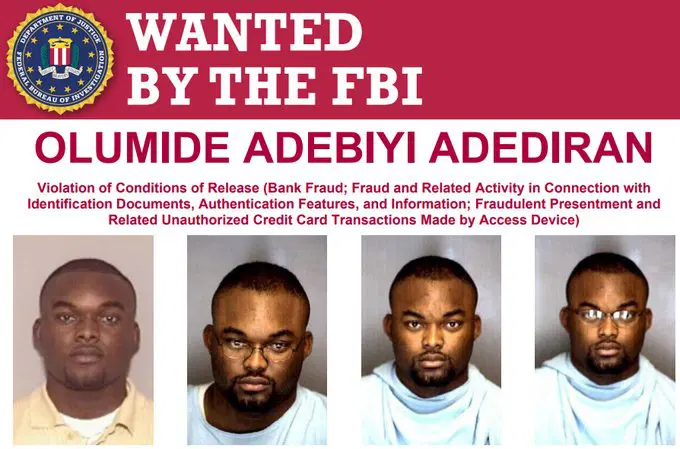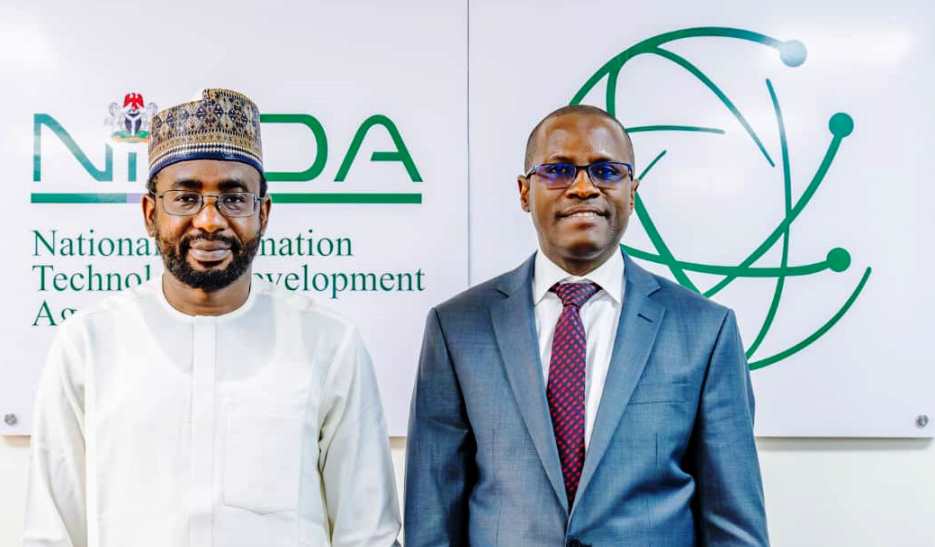FBI Offers ₦14 Million Reward as Nigerian Fugitive Remains on the Run After 20 Years: What’s at Stake for West Africa?
In a development that has caught the attention of Nigerians and the wider West African community, the United States Federal Bureau of Investigation (FBI) has announced a reward of up to $10,000 (approximately ₦14 million) for information leading to the arrest and conviction of Olumide Adebiyi Adediran, a Nigerian national who allegedly absconded from justice more than two decades ago. According to official reports, Adediran disappeared in late December 2001, only days before his federal trial was set to begin in the Central District of Illinois.
Adediran was reportedly facing several federal charges, including bank fraud, identification document fraud, and credit card fraud before vanishing without a trace. The FBI alleges that his flight from justice not only interrupted his legal proceedings but also set off years of federal investigation, raising questions about international cooperation and extradition between Nigeria, other West African countries, and the United States.
On its official 𝕏 (formerly Twitter) platform, the FBI stated: “The FBI offers a reward of up to $10,000 for info leading to the arrest and conviction of Olumide Adebiyi Adediran, wanted for Violation of Conditions of Release. Adediran fled the Central District of Illinois at the end of December 2001, shortly before his trial was set to begin on federal charges of Bank Fraud, Identification Document Fraud, and Credit Card Fraud.”

How Did the Case Begin? Unpacking the Allegations
According to details made public on the FBI’s official website, Adediran’s legal trouble began in August 2001, when he allegedly walked into a bank in Champaign, Illinois, and attempted to withdraw funds using a fraudulent check. Investigators further allege that he used stolen personal information belonging to U.S. citizens to open new bank accounts and gain access to credit lines under false pretenses. These charges carry serious penalties under U.S. law, often leading to years of imprisonment if convicted.
Adediran’s decision to abscond just before the start of his trial reportedly violated the conditions of his release on bail. As a result, in early January 2002, the United States District Court for the Central District of Illinois, located in Urbana, issued a federal arrest warrant charging him with “Violation of Conditions of Release.”
The Challenges of Tracking International Fugitives
Cases like this bring into sharp focus the complexities faced by law enforcement agencies when suspects cross international borders. Tracking fugitives across continents requires robust cooperation between local law enforcement, Interpol, and judicial agencies. In the words of Lagos-based security analyst, Ibrahim Ajayi, “An absence of extradition agreements or insufficient collaboration can mean accused individuals evade justice for years, even for serious financial crimes.”
Nigeria and the United States maintain diplomatic relations and occasionally cooperate on high-profile extradition cases, but the process can be lengthy and complicated. Similar instances have occurred in the past, such as the extradition of Nigerian cybercrime suspect Obinwanne Okeke (“Invictus Obi”) to the U.S. in 2020, highlighting both progress and persistent challenges in mutual legal assistance.
Local and Regional Implications: How Does This Reflect on West Africa?
Financial crimes allegedly involving West Africans living abroad have often made headlines, leading to perceptions—fair or not—that region-based actors play outsized roles in internet and bank fraud cases. While the vast majority of Nigerians and West Africans are law-abiding, stories like Adediran’s attract global scrutiny. According to Chinyere Okafor, a financial crimes expert at a Lagos consultancy, “International incidents like these create obstacles for legitimate West African travelers and professionals who already face tough visa demands and extra scrutiny at foreign borders.”
For Ghanaians and others across the subregion, the story is a reminder of the need for strong reputational safeguards and for governments to proactively combat fraud and identity theft. Recent reports from the Economic and Financial Crimes Commission (EFCC) in Nigeria suggest a steady increase in financial crime prosecutions, with hundreds of convictions recorded every year. Nevertheless, gaps remain, particularly in cross-border intelligence sharing and the timely return of accused persons wanted abroad.
A Global Perspective: What Does the FBI Reward Mean?
The FBI’s public offer of a reward—amounting to about ₦14 million at current exchange rates—demonstrates the seriousness with which U.S. authorities treat such violations. The Bureau has assured that all information about Adediran’s whereabouts will be handled confidentially to protect tipsters and ensure the integrity of the investigation.
Rewards of this nature are not uncommon in the U.S., especially for suspects who have managed to elude capture over time. The public appeal, amplified through social media and international news outlets, increases the chances of leads coming from fellow Nigerians or other West Africans who might have encountered Adediran during the years he’s been absent from the U.S. law enforcement’s radar.
How Long-Standing Fugitives Influence the Fight Against Fraud
The Adediran case is one of many involving suspects from the African continent accused of financial misconduct in the U.S. According to records from the U.S. Department of Justice, hundreds of accused fraudsters are at large, some linked to schemes operating across North America, Europe, and Africa. The inability to bring such individuals to justice, experts warn, emboldens organized crime networks and complicates the reputation of Nigeria and its people.
However, there are ongoing reforms within Nigeria and across West Africa. EFCC spokesperson Wilson Uwujaren recently stated in a media chat, “The era of impunity is fading as more suspects are held accountable at home and abroad. Successful cases send a signal that justice will eventually catch up with fugitives—no matter how far they run.”
Consequences and the Way Forward
Legally, individuals found guilty of bank and identity fraud in the United States can face sentences of up to 20 years or more, depending on the scale and specifics of their crimes. When fugitives violate their bail conditions and abscond, additional charges are often levied—further complicating any hope of leniency if they are eventually apprehended.
The case underscores ongoing calls within West Africa for more robust identity verification systems, better protection of personal data, and stronger institutional links with international partners on financial crimes.
Public Response and Social Media Reactions
Online, reactions among Nigerians have ranged from surprise to disappointment, with many calling for collective responsibility in restoring the country’s image abroad. Some social media users cited the negative impact such stories have on genuine entrepreneurs and students living overseas, while others expressed hope that modern technology would aid in locating long-term fugitives like Adediran.
Civil society groups further urge the government to educate youth about the consequences of fraud, both for individual lives and national prestige. According to a statement by Nigeria’s Center for Cyber Awareness, “Building a culture of transparency and integrity is our best defense against the stigma of international financial crime.”
Conclusion: What Lies Ahead for Nigeria, West Africa, and Justice?
As the FBI intensifies its search and increases public engagement through financial incentives, the Adediran saga is a potent reminder of the complexity of international law enforcement, particularly in cases of alleged fraud. While the majority of Nigerians uphold the country’s values, international incidents like these underscore the need for vigilance, ethical conduct, and partnership between governments. Whether Adediran will eventually be located and brought to justice remains uncertain, but the pursuit continues to attract local and global attention.
What’s your perspective on how cases like this affect Nigeria’s image abroad? Do you think enough is being done to address cross-border fraud? Share your thoughts in the comment section below and stay tuned for future updates.
We want to hear your voice! If you’ve experienced similar issues, have information, or simply want your perspective featured, let us know. Email us at story@nowahalazone.com to get your story posted or discuss story sales.
For general support, contact us at support@nowahalazone.com.
Don’t forget to follow us for more news and analysis: Facebook, X (Twitter), and Instagram.
What’s your view on this story? Drop a comment and join the conversation!










